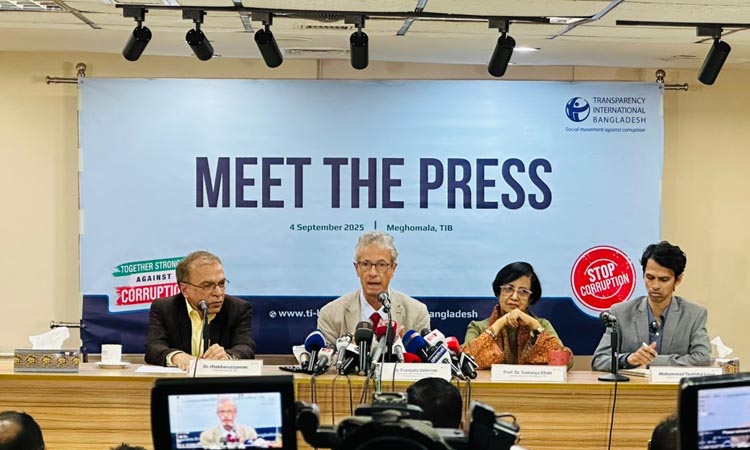News Flash

DHAKA, Sep 4, 2025 (BSS) - In the face of a global rise of authoritarianism, the new Bangladesh began its journey with a dream born from unprecedented sacrifices that overthrew authoritarian rule, said Transparency International (TI) Chair François Valérian.
“To fulfil that dream, it is essential to maintain the continuity of reforms. Although corruption still exists even after the fall of the authoritarian government, the fight against it must continue,” he said.
On the final day of his first visit to Dhaka, Transparency International (TI) Chair François Valérian made this remark during a ‘Meet the Press’ session with journalists from various media outlets.
The program was also attended by TIB Executive Director Dr. Iftekharuzzaman; Adviser, Executive Management Prof. Dr. Sumaiya Khair, and Communication & Outreach Director Mohammad Tauhidul Islam.
At the start of his remarks, reflecting on his visit to Dhaka, he also noted that had billions of dollars not been laundered abroad, Bangladesh’s GDP could have been significantly higher, said a press release.
He further emphasized the need for global cooperation, adequate civic space, and an independent judiciary to effectively combat corruption.
TI Chair François Valérian said, “Our global movement admires what is happening in Bangladesh. We know the stakes are high and that reforms are ongoing. All these reforms must be sustained. There needs to be a sustainable effort that delves deeply into the necessary reforms of the state and into how power is exercised at every level in Bangladesh.”
Addressing the challenges faced by the Interim Government, the TI Chair said, “The challenges are high and I feel that the interim government is aware and genuinely willing to address those challenges. Corruption did not vanish from the country after fall of the authoritarian regime. But there are reforms that are being worked on. Some of them have started, some of them are being implemented and that is what counts.”
Expressing deep concern over the global rise of corruption, he said, “Under the authoritarian regime, an average of 16 billion dollars was stolen from Bangladesh each year. Officials at various levels of power were involved, feeling the global economy of corruption,”
He said worldwide, an estimated one trillion dollars is stolen every year, with money often being laundered from developing countries to developed ones.
“This global economy of corruption effectively destroys the value of money, turning public funds that could generate economic and social value into meaningless private wealth. Had this money not been stolen, Bangladesh’s GDP would have been much higher and more equitably distributed, helping to reduce inequalities. It could also have been used far more effectively to fight poverty,” he said.
To prevent the siphoning of public funds, the TI Chair suggested that civil society organizations must be aware of stolen assets and put pressure on the government to secure international cooperation.
He added, “Those involved in plundering public money are hiding behind legal entities. We need to identify the individuals behind these entities in every country. Only then governments of the Global South and Global North can cooperate effectively. This cooperation will happen only if civil society exerts strong pressure and knows where the assets are. There must also be restitution measures in the countries to which public money is transferred, so that it can be returned”
In response to a question from journalists, Valérian said, “For speaking out against corruption, TIB has always been criticized by those in power. At every government’s tenure, TIB has pointed out mistakes and shortcomings and offered criticism. Since its founding, no government has refrained from criticizing TIB. After the elections in February, the government that comes to power may also feel uncomfortable due to TIB’s watchdog role.”
Supporting Valérian’s statement, Dr. Iftekharuzzaman said, “The average annual outflow of 16 billion dollars from Bangladesh during the rule of the fallen authoritarian government is only a partial estimate; the actual amount laundered is much higher,”
Under the shadow of authoritarianism, he said corruption was the root cause of entrenched inequality in the country adding that power was monopolized to protect corruption, and state institutions were made to facilitate it.
“Over the past 15 years, more than twice the total amount of annual foreign investment—combined with foreign development aid—has been siphoned off through corruption. To prevent a recurrence of this situation, two priorities must be emphasized: first, preventing illicit financial outflows, and second, recovering laundered funds,” the TIB Executive Director said.
“TIB believes that the main focus should be on ensuring that no money can be laundered from Bangladesh under any circumstances. The process of recovering laundered funds is long-term and highly complex, which is why, globally, only about one percent of laundered funds is ever returned. Closing all avenues for money laundering is therefore far more effective and important. With political will and institutional capacity, it is also a more realistic approach.” He added.